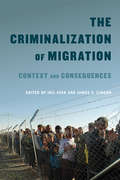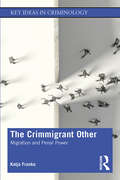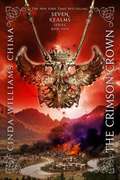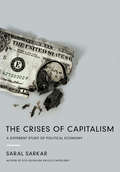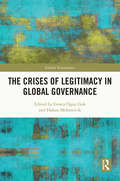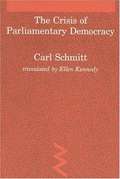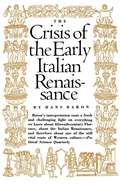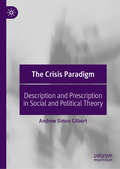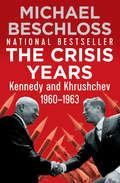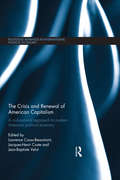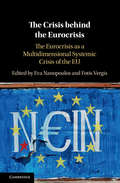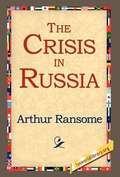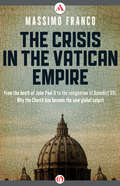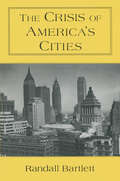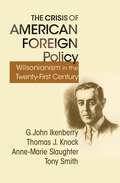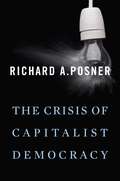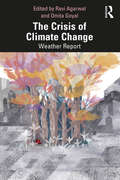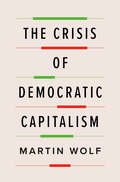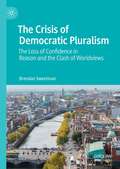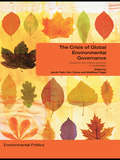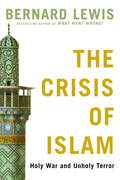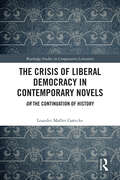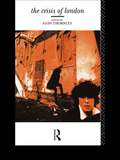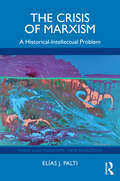- Table View
- List View
The Criminalization of Migration: Context and Consequences (McGill-Queen's Refugee and Forced Migration Studies Series #1)
by James C. Simeon Idil AtakWith over 240 million migrants in the world, including over 65 million forced migrants and refugees, states have turned to draconian measures to stem the flow of irregular migration, including the criminalization of migration itself. Canada, perceived as a nation of immigrants and touted as one of the most generous countries in the world today for its reception of refugees, has not been immune from these practices. <P><P> This book examines "crimmigration" – the criminalization of migration – from national and comparative perspectives, drawing attention to the increasing use of criminal law measures, public policies, and practices that stigmatize or diminish the rights of forced migrants and refugees within a dominant public discourse that not only stereotypes and criminalizes but marginalizes forced migrants. Leading researchers, legal scholars, and practitioners provide in-depth analyses of theoretical concerns, legal and public policy dimensions, historic migration crises, and the current dynamics and future prospects of crimmigration. The editors situate each chapter within the existing migration literature and outline a way forward for the decriminalization of migration through the vigorous promotion and advancement of human rights. <P><P> Building on recent legal, policy, academic, and advocacy initiatives, The Criminalization of Migration maps how the predominant trend toward the criminalization of migration in Canada and abroad can be reversed for the benefit of all, especially those forced to migrate for the protection of their inherent human rights and dignity.
The Crimmigrant Other: Migration and Penal Power (Key Ideas in Criminology)
by Katja FrankoWestern societies are immersed in debates about immigration and illegality. This book examines these processes and outlines how the figure of the "crimmigrant other" has emerged not only as a central object of media and political discourse, but also as a distinct penal subject connecting migration and the logic of criminalization and insecurity. Illegality defines not only a quality of certain acts, but becomes an existential condition, which shapes the daily lives of large groups within the society. Drawing on rich empirical material from national and international contexts, Katja Franko outlines the social production of the crimmigrant other as a multi-layered phenomenon that is deeply rooted in the intricate connections between law, scientific knowledge, bureaucratic practices, politics and popular discourse.
The Crimson Crown (Seven Realms #4)
by Cinda Williams ChimaIn the fourth and final novel in the Seven Realms series, Queen Raisa 'ana Marianna and Han Alister join forces to right a thousand-year-old wrong.
The Crises of Capitalism: A Different Study of Political Economy
by Graciela Calderon Saral SarkarFor nearly 300 years, capitalism propelled the world's most successful economies to new heights of development. But a spate of global environmental disasters and severe economic crises compels thinkers to question whether the system continues to function. Leveraging historical perspective, extensive research, and case studies, The Crises of Capitalism builds a compelling argument that challenges the most fundamental assumptions of prevailing economic theory.Saral Sarkar exposes capitalism's flaws through the lens of ecosocialism, a philosophy that asserts that natural resources drive production and development. Keynes, Schumpeter, Marx, and Engles had no reason to believe that there would ever be a shortage of oil, minerals, water, or food-and that technological innovation could surmount any obstacle. But oil extraction has peaked, food is harder to come by, and the cost to maintain what natural resources remain has increased exponentially. Capitalism requires constant innovation to create growth-but as Sarkar establishes, even computers wouldn't exist without copper, gold, and zinc.The Crises of Capitalism exists at the intersection of environmental awareness and economic theory. Sarkar challenges predominant explanations for catastrophic events like the 2008 global economic crisis, revises the classic paradigm of growth, and points to evidence of systemic economic failure. In this provocative, revolutionary criticism, Sarkar suggests that like other long-abandoned economic theories, capitalism has reached its limits."This is an important book, and it is on the front edge of the thinking that has to come to bear on the real crisis the world is facing, of the impossible idea of growth forever and the economic model that is driving the planet into irreversible crises." -Doug Tompkins
The Crises of Legitimacy in Global Governance (Global Governance)
by Gonca Oguz Gok Hakan MehmetcikExamining the interplay between the domestic, regional and global aspects of the crisis of legitimacy of global governance, this book theoretically questions and empirically analyses the "crises of legitimacy" in global governance with respect to various mechanisms, actors, and issues. It expertly sheds lights on contemporary legitimacy contestations and crises by analysing conceptual, theoretical and empirical aspects of the legitimacy in global governance. The specific issues and case studies collected in this volume survey the evolving nature of legitimacy and legitimization processes in global governance with historical, and theoretical analysis. Perspectives on specific actors and issues provide vital insights for understanding several commonalities and differences of legitimacy crises faced at various global governance mechanisms. Improving the understanding of the strengths and weaknesses of current global governance bodies by showing several legitimacy contestations and crises at global and regional level, this book will be of great interest to scholars of international relations, globalization, international Political Economy, regionalism, and general global governance studies.
The Crisis Of Parliamentary Democracy
by Ellen Kennedy Carl Schmitt Thomas McCarthyThe Crisis of Parliamentary Democracy offers a powerful criticism of the inconsistencies of representative democracy. <p><p> Described both as "the Hobbes of our age" and as "the philosophical godfather of Nazism," Carl Schmitt was a brilliant and controversial political theorist whose doctrine of political leadership and critique of liberal democratic ideals distinguish him as one of the most original contributors to modern political theory. The Crisis of Parliamentary Democracy offers a powerful criticism of the inconsistencies of representative democracy. <p> First published in 1923, it has often been viewed as an attempt to destroy parliamentarism; in fact, it was Schmitt's attempt to defend the Weimar constitution. The introduction to this new translation places the book in proper historical context and provides a useful guide to several aspects of Weimar political culture. The Crisis of Parliamentary Democracy is included in the series Studies in Contemporary German Social Thought, edited by Thomas McCarthy.
The Crisis Of The Early Italian Renaissance
by Hans BaronHans Baron was one of the many great German émigré scholars whose work Princeton brought into the Anglo-American world. His Crisis of the Early Italian Renaissance has provoked more discussion and inspired more research than any other twentieth-century study of the Italian Renaissance. <p><p> Baron's book was the first historical synthesis of politics and humanism at that momentous critical juncture when Italy passed from medievalism to the thought of the Renaissance. Baron, unlike his peers, married culture and politics; he contended that to truly understand the Renaissance one must understand the rise of humanism within the political context of the day. This marked a significant departure for the field and one that changed the direction of Renaissance studies. Moreover, Baron's book was one of the first major attempts of any sort to ground intellectual history in a fully realized historical context and thus stands at the very origins of the interdisciplinary approach that is now the core of Renaissance studies. <p> Baron's analysis of the forces that changed life and thought in fifteenth-century Italy was widely reviewed domestically and internationally, and scholars quickly noted that the book "will henceforth be the starting point for any general discussion of the early Renaissance." The Times Literary Supplement called it "a model of the kind of intensive study on which all understanding of cultural process must rest." First published in 1955 in two volumes, the work was reissued in a one-volume Princeton edition in 1966.
The Crisis Paradigm: Description and Prescription in Social and Political Theory
by Andrew Simon GilbertThis book examines how 20th century theorists have used a discourse of “crisis” to frame their conceptualizations of modernity. Through an investigation of four key thinkers (Georg Lukács, Hannah Arendt, Reinhart Koselleck and Jürgen Habermas), Gilbert argues that scholars in the social sciences and humanities should be cautious of treating crises as explananda for research. Instead, the book calls for sociological analysis of the role of “crisis” within social scientific discourse, and examines how “crisis” has been used as a conceptual frame for legitimating theoretical agendas. Gilbert’s “sociology of concepts” approach presents crisis as a paradigm of modern thought, and, more generally, reflects on how concepts can become the carriers of diverse intellectual traditions and debates. The Crisis Paradigm will be of interest to students and scholars of social and critical theory, politics, sociology and history, as well as those working in the fields of media studies, communication and discourse analysis.
The Crisis Years: Kennedy and Khrushchev, 1960–1963
by Michael BeschlossThe groundbreaking and revelatory tale of the most dangerous years of the Cold War and the two leaders who held the fate of the world in their hands. This bestselling history takes us into the tumultuous period from 1960 through 1963 when the Berlin Wall was built and the Bay of Pigs invasion and the Cuban Missile Crisis brought the United States and Soviet Union to the abyss. In this compelling narrative, author Michael Beschloss, praised by Newsweek as &“the nation&’s leading Presidential historian,&” draws on declassified American documents and interviews with Kennedy aides and Soviet sources to reveal the inner workings of the CIA, Pentagon, White House, KGB, and politburo, and show us the complex private relationship between President John F. Kennedy and Soviet Premier Nikita Khrushchev. Beschloss discards previous myths to show how the miscalculations and conflicting ambitions of those leaders caused a nuclear confrontation that could have killed tens of millions of people. Among the cast of characters are Robert Kennedy, Robert McNamara, Adlai Stevenson, Fidel Castro, Willy Brandt, Leonid Brezhnev, and Andrei Gromyko. The Bay of Pigs invasion, the Vienna Summit, the Berlin Crisis, and what followed are rendered with urgency and intimacy as the author puts these dangerous years in the context of world history. &“Impressively researched and engrossingly narrated&” (Los Angeles Times), The Crisis Years brings to vivid life a crucial epoch in a book that David Remnick of the New Yorker has called the &“definitive&” history of John F. Kennedy and the Cold War.
The Crisis and Renewal of U.S. Capitalism: A Civilizational Approach to Modern American Political Economy (Routledge Advances In International Political Economy Ser.)
by Laurence Cossu-Beaumont Jacques-Henri Coste Jean-Baptiste VelutDespite the reversal of America’s fortune from the triumphalism of the Roaring Nineties to the gloom of the lost decade and the Great Depression, theoretical conceptions of US capitalism have remained surprisingly unchanged. In fact, if the crisis questioned the sustainability of the US capitalist paradigm, it did not fundamentally challenge academic theorization of American political economy. This book departs from the American political economy literature to identify three common myths that have shaped our conceptualization of US capitalism: its reduction to a state-market dyad dis-embedded from societal factors; the illusion of a weak state and the synchronic conception of the US variety of capitalism. To remedy these pitfalls, the authors propose a civilizational approach to American political economy at the crossroads between cultural studies, history, sociology and political science. Drawing together contributions from a rich variety of fields (from geography to cultural studies, political science and sociology) this work sheds a new light on America’s "cultural political economy" combining theoretical reflection with empirical data and offering innovative perspectives on the crisis and renewal of American capitalism.
The Crisis behind the Eurocrisis: The Eurocrisis as a Multidimensional Systemic Crisis of the EU
by Eva Nanopoulos Fotis VergisThe Crisis behind the Euro-Crisis encourages dialogue among scholars across the social sciences in an attempt to challenge the narrative that regarded the Euro-crisis as an exceptional event. It is suggested instead that the Euro-crisis, along with the subsequent crises the EU has come to face, was merely symptomatic of deeper systemic cracks. This book's aim is to uncover that hidden systemic crisis - the 'crisis behind the Euro-crisis'. Under this reading it emerges that what needs to be questioned is not only the allegedly purely economic character of the Euro-crisis, but, more fundamentally, its very classification as an 'emergency'. Instead, the Euro-crisis needs to be regarded as expressive of a chronic, dysfunctional, but 'normal' condition of the EU. By following this line of analysis, this book illuminates not only the causes of contemporary turbulences in the European project, but perhaps the 'true' nature of the EU itself.
The Crisis in Russia
by Arthur RansomeTHE characteristic of a revolutionary country is that change is a quicker process there than elsewhere. As the revolution recedes into the past the process of change slackens speed. Russia is no longer the dizzying kaleidoscope that it was in 1917. No longer does it change visibly from week to week as it changed in 19l8. Already, to get a clear vision of the direction in which it is changing, it is necessary to visit it at intervals of six months, and quite useless to tap the political barometer several times a day as once upon a time one used to do. . . . But it is still changing very fast. My jourrnal of "Russia in 1919,"while giving as I believe a fairly accurate pictureof the state of affairs in February and March of 1919, pictures a very different stage in the development of the revolution from that which would be found by observers today. The prolonged state of crisis in which the country has been kept by external war, while strengthening the ruling party by rallying even their enemies to their support, has had the other effects that a national crisis always has on the internal politics of a country. Methods of government which in normal times would no doubt be softened or disguised by ceremonial usage are used nakedly and justified by necessity.
The Crisis in the Vatican Empire
by Massimo FrancoScandals, internal power struggles, whistleblowers, and the challenge of a quickly changing world. This book helps readers understand one of the most tormented periods of transition in the history of the Catholic Church. Benedict XVI's epochal decision to resign as pope not only ended his pontificate, but has revealed a new identity crisis within the Catholic Church--the paragon of virtue--forcing it into the awkward position of having to explain and to confess its own "sins" and convince the public that it is reforming and will change its behavior. The church is perceived by adversaries as the "second Kremlin," doomed to the same ruin that marked the fall of the Soviet empire. Massimo Franco analyzes the deep-seated causes and implications of the Catholic Church's disintegration.
The Crisis of America's Cities: Solutions for the Future, Lessons from the Past
by Randall BartlettAn original work on American cities and the ongoing "urban crisis". Using the metaphor of the socially constructed organization of space, Bartlett takes a broad view of the evolution of urban America, from its historical roots to the present; he then examines the way in which current policies have responded to, and affected the organization of space (covering housing, transportation, government and other urban problems). He concludes with a look to the future of American cities, how they will impact and be impacted on by changing commercial and labor markets, by the problems of poverty and cultural change. In an epilogue, he explores possible ways to overcome the "social dilemmas", while recognizing the difficulty of this undertaking.A thoroughly unique perspective to the study of cities, this book is about how space is used in America and how it changes as the "logic of location" evolves historically. Starting with the assumption that cities are fundamentally unnatural" phenomena, it unravels the interactions of technological advances that have made them possible and policies that have given them shape.
The Crisis of American Foreign Policy: Wilsonianism in the Twenty-first Century
by G. John Ikenberry Anne-Marie Slaughter Tony Smith Thomas KnockWas George W. Bush the true heir of Woodrow Wilson, the architect of liberal internationalism? Was the Iraq War a result of liberal ideas about America's right to promote democracy abroad? In this timely book, four distinguished scholars of American foreign policy discuss the relationship between the ideals of Woodrow Wilson and those of George W. Bush. The Crisis of American Foreign Policy exposes the challenges resulting from Bush's foreign policy and ponders America's place in the international arena. Led by John Ikenberry, one of today's foremost foreign policy thinkers, this provocative collection examines the traditions of liberal internationalism that have dominated American foreign policy since the end of World War II. Tony Smith argues that Bush and the neoconservatives followed Wilson in their commitment to promoting democracy abroad. Thomas Knock and Anne-Marie Slaughter disagree and contend that Wilson focused on the building of a collaborative and rule-centered world order, an idea the Bush administration actively resisted. The authors ask if the United States is still capable of leading a cooperative effort to handle the pressing issues of the new century, or if the country will have to go it alone, pursuing policies without regard to the interests of other governments. Addressing current events in the context of historical policies, this book considers America's position on the global stage and what future directions might be possible for the nation in the post-Bush era.
The Crisis of Capitalist Democracy
by Richard A. PosnerFollowing up on his timely and well-received book, "A Failure of Capitalism," Richard Posner steps back to take a longer view of the continuing crisis of democratic capitalism as the American and world economies crawl gradually back from the depths to which they had fallen in the autumn of 2008 and the winter of 2009. By means of a lucid narrative of the crisis and a series of analytical chapters pinpointing critical issues of economic collapse and gradual recovery, Posner helps non-technical readers understand business-cycle and financial economics, and financial and governmental institutions, practices, and transactions, while maintaining a neutrality impossible for persons professionally committed to one theory or another. He calls for fresh thinking about the business cycle that would build on the original ideas of Keynes. Central to these ideas is that of uncertainty as opposed to risk. Risk can be quantified and measured. Uncertainty cannot, and in this lies the inherent instability of a capitalist economy. As we emerge from the financial earthquake, a deficit aftershock rumbles. It is in reference to that potential aftershock, as well as to the government s stumbling efforts at financial regulatory reform, that Posner raises the question of the adequacy of our democratic institutions to the economic challenges heightened by the greatest economic crisis since the Great Depression. The crisis and the government s energetic response to it have enormously increased the national debt at the same time that structural defects in the American political system may make it impossible to pay down the debt by any means other than inflation or devaluation.
The Crisis of Climate Change: Weather Report
by Ravi Agarwal Omita GoyalThis volume outlines the specific conditions and responses to climate change in India. It discusses various aspects of the planetary crisis that have acquired widespread global urgency: global warming induced by anthropogenic emissions, largely owing to the fossil fuel-based economic growth model; severe environmental decline; and the catastrophic consequences that threaten the very foundations of modern life, which has been based on using nature as a ‘resource’ instead of as an ecosystem in which human life exists. The book brings together contributors with expertise in fi elds as varied as national security, public policy, environmental law, climate justice activism, anthropology, restoration ecology, conservation biology, wildlife ecology, the health sector and medicine, conservation science and sustainability, gender, humanities and the creative arts. It includes a new spectrum of responses—holistic or alternate, literary and the arts, dance and poetry—and their interface with climate change, which are often left out in science and policy circles, and an unusual ground-up approach with grassroots movements’ perspectives along with theoretical practices and a Gandhian way of thinking in a global economy. Comprehensive, accessible and topical, this book will be useful to scholars and researchers of environmental and sustainability studies, natural resources, environment and technology, sociology of development, development studies, public policy, energy and environment and urbanisation. It will also interest practitioners, policymakers, think tanks and NGOs working on climate change issues.
The Crisis of Democratic Capitalism
by Martin WolfFrom the chief economics commentator of the Financial Times, a magnificent reckoning with how and why the marriage between democracy and capitalism is coming undone, and what can be done to reverse this terrifying dynamicMartin Wolf has long been one of the wisest voices on global economic issues. He has rarely been called an optimist, yet he has never been as worried as he is today. Liberal democracy is in recession, and authoritarianism is on the rise. The ties that ought to bind open markets to free and fair elections are threatened, even in democracy&’s heartlands, the United States and England. Around the world, powerful voices argue that capitalism is better without democracy; others argue that democracy is better without capitalism. This book is a forceful rejoinder to both views. Even as it offers a deep, lucid assessment of why this marriage has grown so strained, it makes clear why a divorce of capitalism from democracy would be a calamity for the world. They need each other even if they find it hard to life together. For all its flaws, argues Wolf, democratic capitalism remains far and away the best system for human flourishing. But something has gone seriously awry: the growth of prosperity has slowed, and the division of its fruits between the hypersuccessful few and the rest has become more unequal. The plutocrats have retreated to their bastions, where they pour scorn on government&’s ability to invest in the public goods needed to foster opportunity and sustainability. But the incoming flood of autocracy will rise to overwhelm them, too, in the end. Citizenship is not just a slogan or a romantic idea; it&’s the only idea that can save us, Wolf argues. Nothing has ever harmonized political and economic freedom better than a shared faith in the common good. This wise and rigorously fact-based exploration of the epic story of the dynamic between democracy and capitalism concludes with the lesson that our ideals and our interests not only should align, but must do so, for everyone&’s sake. Democracy itself is now at stake.
The Crisis of Democratic Pluralism: The Loss of Confidence in Reason and the Clash of Worldviews
by Brendan SweetmanThis book argues that contemporary liberal democracy is reaching a crisis. Brendan Sweetman contends that this crisis arises from a contentious pluralism involving the rise of incommensurable worldviews that emerge out of the absolutizing of freedom over time in a democratic setting. This clash of worldviews is further complicated by a loss of confidence in reason and by the practical failure of public discourse. A contributory factor is the growing worldview of secularism which needs to be distinguished from both the process of secularization and the concept of the secular state. After describing the crisis, and exploring these themes, and also rejecting proposed solutions from recent liberal political theory, Sweetman develops an approach to pluralist disagreement which requires a re-envisioning of the relationship between religion, secularism and politics, and which allows a limited place for all worldviews in the state, including religious worldviews. Engaging with the work of Philip Kitcher, Robert Audi, John Rawls, A.C. Grayling, Martin Luther King, Cécile Laborde, John Stuart Mill, John Locke, and Plato, Sweetman's approach is a formidable innovation in the quest to maintain a free and fair society.
The Crisis of Global Environmental Governance: Towards a New Political Economy of Sustainability (Environmental Politics)
by Ken Conca Matthias Finger Jacob ParkMore than twenty years after the Bruntland Commission report, Our Common Future, we have yet to secure the basis for a serious approach to global environmental governance. The failed 2002 World Summit on Sustainable Development showed the need for a new approach to globalization and sustainability. Taking a critical perspective, rooted in political economy, regulation theory, and post-sovereign international relations, this book explores questions concerning the governance of environmental sustainability in a globalizing economy. With contributions from leading international scholars, the book offers a comprehensive framework on globalization, governance, and sustainability, and examines institutional mechanisms and arrangements to achieve sustainable environmental governance. It: considers current failures in the framework of global environmental governance addresses the problematic relationship between sustainability and globalization explores controversies of development and environment that have led to new processes of institution building examines the marketization of environmental policy-making; stakeholder politics and environmental policy-making; socio-economic justice; the political origins of sustainable consumption; the role of transnational actors; and processes of multi-level global governance. This book will be of interest to students and researchers of political science, international studies, political economy and environmental studies.
The Crisis of Global Modernity
by Prasenjit DuaraIn this major new study, Prasenjit Duara expands his influential theoretical framework to present circulatory, transnational histories as an alternative to nationalist history. Duara argues that the present day is defined by the intersection of three global changes: the rise of non-western powers, the crisis of environmental sustainability and the loss of authoritative sources of what he terms transcendence - the ideals, principles and ethics once found in religions or political ideologies. The physical salvation of the world is becoming - and must become - the transcendent goal of our times, but this goal must transcend national sovereignty if it is to succeed. Duara suggests that a viable foundation for sustainability might be found in the traditions of Asia, which offer different ways of understanding the relationship between the personal, ecological and universal. These traditions must be understood through the ways they have circulated and converged with contemporary developments.
The Crisis of Islam
by Bernard LewisPresident Bush has made it clear that we are engaged in a war against terrorism. But for Usama bin Laden and his followers this is religious war, a war for Islam against infidels, especially the United States, the greatest power in the world of the infidels. In this book Bernard Lewis shows us where the anger and frustration have come from, and the extent to which almost the entire Muslim world is affected by poverty and tyranny. He looks at the influence of extreme Wahhabist doctrines in the Saudi kingdom, where custodianship of Islam's holy places and the revenues of oil have given world-wide impact to what would otherwise have been an extremist fringe in a marginal country. He looks at American double standards, which have long caused Muslim anger. He tells us what the real meaning is of Islamic fundamentalism', jihad' and fatwa', and why the peoples of the Middle East are conscious of history in a way that most Americans find difficult to understand.
The Crisis of Liberal Democracy in Contemporary Novels: or The Continuation of History (Routledge Studies in Comparative Literature)
by Leander Møller GøttckeThis book explores how contemporary novels reflect a profound shift in Western culture, from the political optimism of the post-Cold War era to growing fears about the future of liberal democracy. Analysing four major works – Karl Ove Knausgård's My Struggle series, Zadie Smith's White Teeth, Boualem Sansal's 2084 and Michel Houellebecq's Submission – it shows how these novels illuminate current social discontents and engages the anxieties of our time. Where the so-called "end-of-history" narrative once promised a triumphant liberal democracy, novelistic fiction today reflects a more ominous outlook: progressives are haunted by dystopian visions of democratic decline, while reactionaries fear cultural displacement and yearn for a lost Golden Age. Bridging literary analysis and political theory, the book offers new perspectives on how literature engages with and challenges contemporary political narratives, making it a vital resource for those interested in the intersection of politics and literature.
The Crisis of London
by Andy ThornleyLondon is in a mess. This is evident from the increasingly unpleasant experience of daily life in the capital, from homelessness and unemployment to frustrating transport facilities and the general bad quality of the environment. However it is not only citizens of London who are suffering but the business community as well. London is having to face increasing competition from other European cities. There is growing appreciation and debate about these problems from companies, political parties, local government and community organisations. The Crisis of London provides a solid analysis of what has gone wrong and explores policy directions that could make the city a more humane and livable place. Beginning with a discussion of the basic elements of a home, a job and a means of travelling around, it becomes clear that even in these essential aspects London is failing. A feature of the crisis is an increasingly divided city with conditions for the poorer citizens worsening all the time. The authors consider the quality of the environment. They examine the greening of the city and the need for sustainability, the privatisation and dehumanisation of public spaces; the fear experienced by women, denying them full access to the capital; the position of ethnic minorities, and the perspectives of local communities. Using the case studies of Docklands and Kings Cross, the author's raise the crucial question of the government of the capital. This review of the city concludes with an analysis of a potential vision for London involving both the creation of the necessary institutional structures and also the will to address the needs of all the capital's citizens. The authors argue that a strategic approach is needed which accepts that the market alone cannot solve the problem. Stronger public intervention and government action is necessary if London is to match the developments in other European cities.
The Crisis of Marxism: A Historical-Intellectual Problem (Marx and Marxisms)
by Elías J. PaltiIn this book, Elías J. Palti analyzes the writings of key thinkers who have theorized the present situation of Marxism: Perry Anderson, Fredric Jameson, Ernesto Laclau, Slavoj Žižek, Judith Butler, Alain Badiou, and Jacques Derrida. His aim is to interrogate what appears to be the final crisis of Marxist political tradition from a historical-intellectual point of view, placing it within a broader framework, which is the present crisis of politics, at large. Yet, it also reveals why we cannot, even then, avoid confronting it, stubbornly trying to think of what seems to be unthinkable today, namely, the idea of an emancipatory horizon.Unlike traditional works of political philosophy, The Crisis of Marxism: A Historical-Intellectual Problem does not intend to provide political or philosophical answers to today’s dislocation of politics. Instead, it aspires to clarify the nature of the questions that such a situation raises and demonstrates why the current crisis of Marxism contains some fundamental clues for it.
